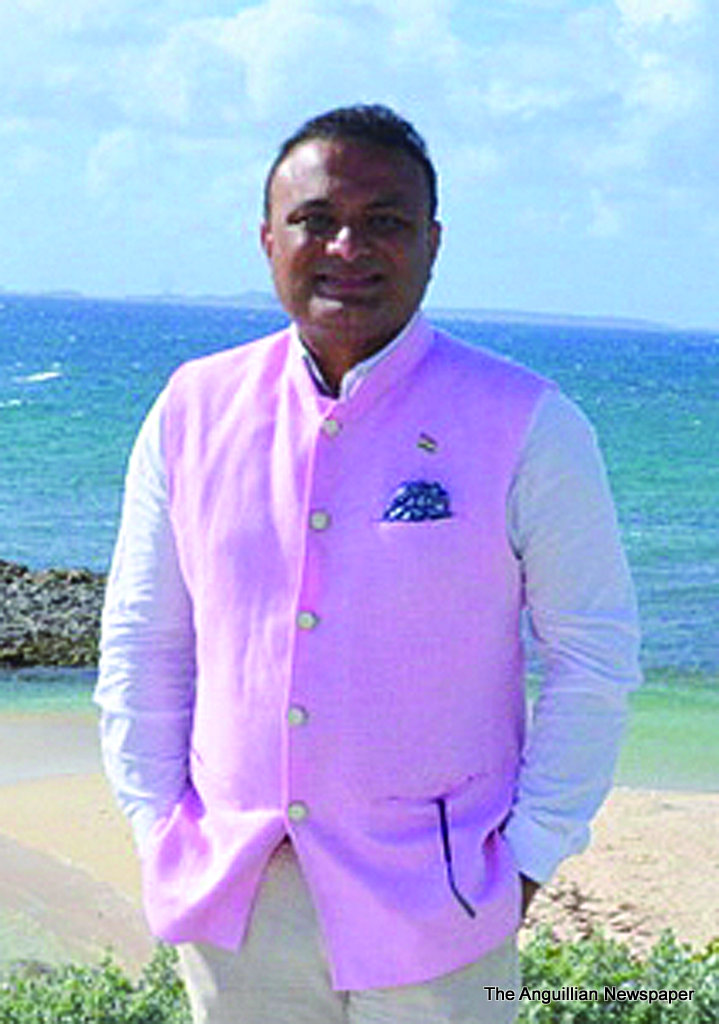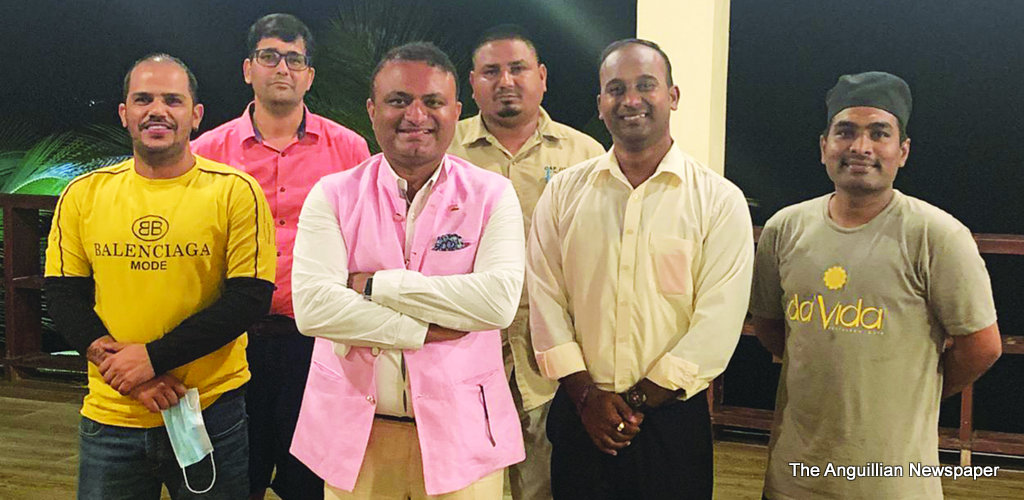
Dr. K.J. Srinivasa, High Commissioner of India to Guyana, Antigua & Barbuda, and St. Kitts & Nevis, visited Anguilla last week and paid courtesy calls on the offices of the Governor, Her Excellency Dileeni Daniel-Selvaratnam, the Honourable Premier, Dr. Ellis L. Webster, the Honourable Minister of Home Affairs, Mr. Kenneth Hodge, as well as other Government officials. The High Commissioner also met with members of the local Indian business community.
Dr. Srinivasa has been making perodic visits to Anguilla over the past three years. The last time he visited was in February of 2020, just prior to the Covid pandemic. At that time he had introduced specific Indian assistance programmes in the areas of medical technology, pharmaceuticals, manufacturing, trade and education, which India was offering the people of the Caribbean.
Now in this Covid pandemic era, Dr. Srinivasa, during his visit last week, sat down with The Anguillian to speak of India’s response to the Covid dilemma, and his nation’s commitment, not only to the countries which falls under its commission, but also to territories of the wider Caribbean region, including Anguilla.
First, he described how industries in India reacted to the pandemic: “Obviously, Covid has affected all of us,” he remarked. “Its impact has been evident everywhere, in big countries like India, as well as well as in smaller countries like yours. But India has become even more resilient than it was before.
“When Covid hit us in 2020, we had to be subject to lockdowns, and our economy was hit heavily. But India, despite the repercussions from the pandemic, is now recuperating very well. Because of Covid — on the contrary — many sectors in India, such as manufacturing, healthcare and pharmaceuticals, chemicals and fertilisers, have received a new impetus.”
“Prior to Covid,” he noted, “we had opened a new relationship with China where we used to import a high percentage of our raw materials from Beijing. But when Covid suddenly hit us, a conscious decision was taken by both the Indian Government and the private sector. We realised that if we kept on relying on imports from China it would not be working to our advantage.

“So what we did was that we began to build more new green-field projects in all of the sectors, and we expanded those projects which we already had. Currently, the Indian Government is giving the sectors a lot of incentives to facilitate these green-field projects. Now, as a result, all sectors are exporting all across the world, and they are constantly taking on new markets.”
He pointed out that, due to Covid, many companies had exited China, and countries like Vietnam, Indonesia and the Philippines benefitted from the new investments of companies out of China. India, in particular, benefitted immensely from many of these companies. “For example,” he noted, “Foxconn used to manufacture cell phones in China. But since the pandemic they moved out and came to India, creating a 5 billion US dollar manufacturing facility.”
The Commissioner insisted: “Despite the pandemic, investments in India are on the uptick. India is becoming a key investment destination. In spite of Covid, we have seen about 50 to 60 billion US dollars of foreign investment over the past two years. We are cognizant of the fact that inflation is on the rise. Inflation is increasing worldwide. We are doing what it takes to control inflation but, at the same time, the Indian Government is providing incentives that would encourage new entrepreneurs to become involved in taking advantage of these new investment opportunities that come to India.”
Explaining how India helps the people of the Caribbean in light of the Covid dilemma, the High Commissioner said: “In terms of our relationship with the world, when Covid str uck, we began to think of how we can help our friends across the world. We consider all these islands in the Caribbean as our friends and, in turn, we are grateful to them for having considered India as a friend.
“When the pandemic began, the Hounourable Prime Minister of India, Mr. Narendra Modi, decided that we must help out our friends in the Caribbean to combat Covid. We had a Fund which he had created after the India-CARICOM summit in 2019. This Fund consisted of about one million dollars for each of our CARICOM partners. We utilized the said Fund to improve the health infrastructure of Guyana, Antigua & Barbuda, and St. Kits and Nevis.
“In fact, we provided 36 ventilators, PPE outfits and emergency medicines for Guyana; we furnished Antigua and Barbuda with one million dollars to completely revamp their Covid hospital; we provided similar health infrastructure improvement for St. Kitts; and gave assistance likewise to several other countries.”
When asked how Anguilla can benefit from such assistance or funding, Dr. Srinivasa answered: “Seeing that Anguilla is an overseas dependent territory, it is in a rather grey area. Since it is not a sovereign country, everything has to be done through the Foreign and Commonwealth Office in the UK. And anything that we offer would have to be routed through the Indian High Commission there. Technically, even though I am the High Commissioner to Guyana, Antigua & Barbuda, and St. Kitts and Nevis, I am a Council General to Anguilla. In that capacity I am, for Anguilla, a grade below the High Commissioner.”
He continued: “However, if there is a need for any assistance in Anguilla, your Minister will communicate that need to me, and I will transfer that request to the Indian High Commission in the UK.
He spoke extensively on the part which India played in furnishing the CARICOM member countries with the Covid vaccine: “When India began the production of AstraZeneca Oxford vaccines against Covid in 2021,” he observed, “the bulk of the doses was produced in India, under licence from the UK. Everyone knows that India is a powerhouse in vaccine production. In fact, before the pandemic, India had supplied one billion vaccines of all varieties, including polio and hepatitis, for the WHO programmes across the world.
“We produce these vaccines as quality products at a low cost, and WHO uses them for its vaccination treatments. To fight against Covid, India’s Prime Minister decided that we will ship 500,000 AstraZeneca vaccines to the Caribbean. These were shipped across the Caribbean in March of last year.”
The High Commissioner made special mention of Antigua’s Prime Minister, Gaston Brown’s, reaction as the vaccines arrived from India on the airport in Antigua for distribution to other Caribbean countries. He reflected: “Mr. Brown’s passionate comment was: ‘This is the single most beneficial act of benevolence, this century, which anyone has done to save lives across the Caribbean.’ “For me, I felt proud to hear that,” the High Commissioner stated.
“We continue to help across the world, he stated. “In the Hindi language, this act of giving away vaccines is called Vaccine-Maitri. Maitri means friendship.”
Asked what kind of aid he thinks Anguilla can benefit from at this moment, he noted: “Anguilla could most likely use India’s assistance in the medical area. We would be willing to export Indian doctors and nurses here. India has extremely talented nurses and specialist doctors who are much sought after. If the Government sees the need, the request for such assistance will be sent to me. I will then coordinate with the Indian High Commission in the UK to have the need supplied.
He also mentioned that India is spearheading technical assistance for renewable energy, particularly in the field of solar power generation. He said that members of the India-based International Solar Alliance can benefit from access to technology — and funding for small solar energy projects.
He further remarked it is estimated that, by 2030, funding for solar energy projects, across the world, will be increased to approximately one trillion US dollars. He said since Anguilla has abundant sunshine, the island can benefit immensely from such India’s assistance in this area, in particular.








